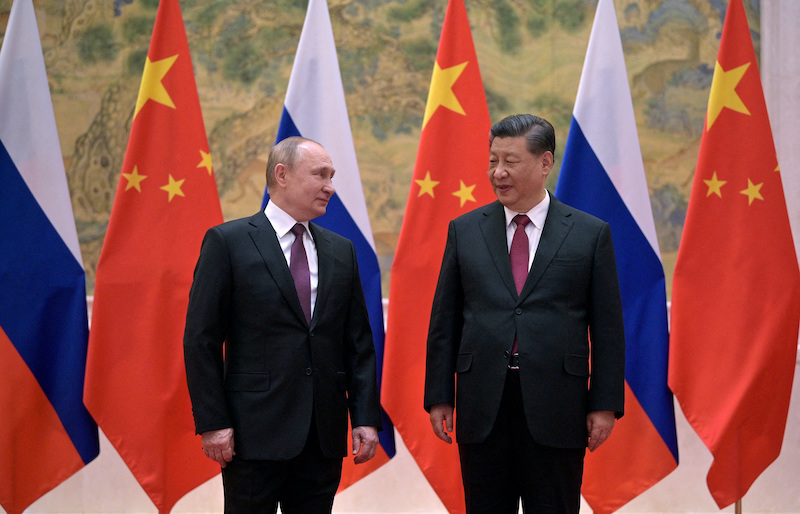Chinese President Xi Jinping reached Moscow on Monday on the heels of the International Criminal Court issuing an arrest warrant for Russian President Vladimir Putin and making him a wanted man in 123 countries.
Xi will be the first national leader to shake Putin’s hand since the warrant, which Beijing said reflects double standards.
Meanwhile, Russia will present Xi’s trip as evidence that it has a powerful friend prepared to stand with it against a hostile West.
Also on AF: India-Russia Oil Deals Erode Dollar’s Currency Dominance
Details on Xi’s visit to Moscow, his first in nearly four years, are scant.
Both sides have said the aim of the trip is to further strengthen their relationship and deepen economic ties. Chinese foreign ministry spokesperson Wang Wenbin said on Friday the trip was a “voyage of friendship”, “cooperation” and “peace”. He did not refer to Ukraine.
The two leaders will meet for one-to-one talks and dine together on Monday, then hold further “negotiations” and issue a statement on Tuesday before Xi departs on Wednesday, according to a brief schedule released by the Kremlin.
If any deals are thrashed out by the two countries, Xi will have upper hand in the relationship, some foreign diplomats say.
“It has been clear for some time that Russia is the junior partner to China but the war in Ukraine has really made that dominance much more stark,” a European diplomat said on condition of anonymity.
“Whatever support Xi gives to Russia will be on China’s terms,” another European diplomat said.
‘No limits’
China and Russia announced a “no limits” partnership in February 2022 when Putin visited Beijing days before he launched the Ukraine invasion.
China has provided key revenue for an increasingly isolated Moscow as its biggest buyer of oil. Bilateral trade between the two has also soared in recent months.
On Monday, Chinese government data showed Russia overtook Saudi Arabia to be China’s top oil supplier in the first two months of 2023.
Arrivals from Russia totalled 15.68 million tonnes in January-February, or 1.94 million barrels per day (bpd), up 23.8% from 1.57 million bpd in the corresponding 2022 period, according to data from the General Administration of Customs.
Russia was China’s second-largest crude supplier last year, shipping 86.2 million tonnes.
‘Mutually beneficial cooperation’
In an article published at the beginning of his visit to Moscow, Xi said the two countries adhered to the concept of “eternal friendship and mutually beneficial cooperation”.
China’s Ukraine peace proposal, released last month, reflects global views and acknowledges difficulties, he said.
“Complex problems do not have simple solutions,” Xi wrote in Rossiiskaya Gazeta, a daily published by the Russian government, according to a Reuters translation from Russian.
At the same time, Putin also wrote an article in China’s People’s Daily, published on the Kremlin website. “We can feel the geopolitical landscape in the outside world undergoing drastic changes,” he wrote, adding that he had high hopes for the visit from his “good old friend”.
Deeper energy partnership
Beijing has said it wants a closer energy partnership with Russia.
Western sanctions over the Ukraine invasion and a price cap on seaborne Russian crude have limited the buyer pool for Moscow’s supply, leading it to trade at deep discounts to international benchmarks.
Independent Chinese refiners, many of them based in Shandong province, have been among the main beneficiaries of this shift in pricing power. Beijing has, overall, saved billions of dollars.
Alongside growing oil and coal deliveries, Putin said Russia was helping to build nuclear power reactors in China, in his People’s Daily article on Sunday.
The two countries were also deepening cooperation in space exploration and new technologies, he added.
‘Diplomatic tightrope’
For Xi, the visit is a diplomatic tightrope.
The Chinese president will seek to burnish Beijing’s diplomatic clout after it brokered a surprise detente between Saudi Arabia and Iran last week.
Xi, who has tightened his control at home as the strongest Chinese leader since Deng Xiaoping, will also be wary of antagonising the West, analysts say. The United States and the European Union – among the fiercest critics of Russia’s war – are China’s top trade partners.
Beijing has also released a 12-point proposal to solve the Ukraine crisis. But the United States and its allies remain deeply sceptical of China’s motives.
The West remains wary of Beijing’s resistance to condemning Russia, while giving it an economic lifeline as others impose sanctions.
The United States and the transatlantic military alliance NATO have also accused China of considering supplying arms to Russia and warned it against doing so.
China has, however, dismissed the accusations.
- Reuters, with additional editing by Vishakha Saxena























